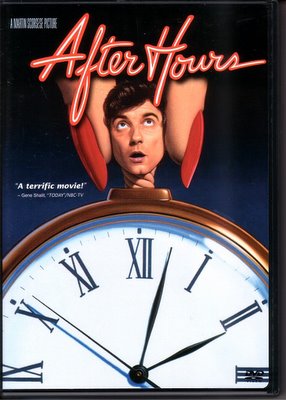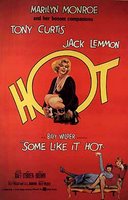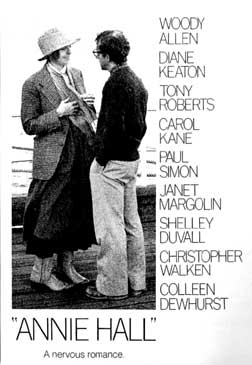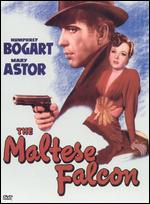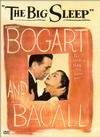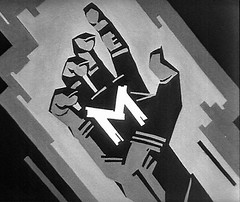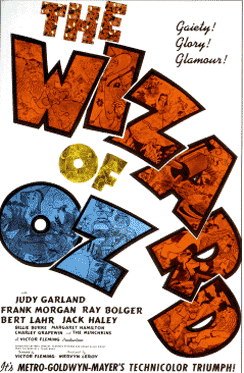
"Gaiety! Glory! Glamour!" is the tagline of 1939's version of "The Wizard of Oz", eventually directed by Victor Fleming adaptation of the beloved book written by L. Frank Baum. And this tagline surely is a good characterization of this movie which had become an all-time classic, as well as favourite musical. Despite the fact that some of the movie's quotes are far more memorable and famous, such as: "There's no place like home", "Lions and tigers and bears, oh my!", "We're not in Kansas anymore," "Follow the Yellow Brick Road". Not to mention the beautiful "Somewhere over the rainbow", which has also inspired lots of covers.
In my opinion, the movie's insight, if i can put it like this, is given by the opening phrase: "For nearly forty years this story has given faithful service to the Young in Heart; and Time has been powerless to put its kindly philosophy out of fashion. To those of you who have been faithful to it in return...and to the Young in Heart...we dedicate this picture." And if you're in this target, there is no possible way that this movie doesn't get to you.
Dorothy is a Kansas girl, living in a Kansas farm - as we find out from the opening sepia-coloured images - together with her Auntie Em, Uncle Henry and their helpers, Hunk, Zeke and Hickory. And she also lives with a little dog that she adores, Toto, and who's in danger because of nasty Almira Gulch wanting to have him killed. However, when a powerful storm comes, Dorothy gets hurt by a crashed window and flies away to a beautiful dream, taking place "somewhere over the rainbow". She becomes the national hero of the Munchkins, after accidentaly killing the Wicked Witch of the East, who had been tourmenting them. And she meets Glinda, a good witch who advises her to go to the Emerald City and look for the wizard of Oz, if she ever wants to return to Kansas. Following the Yellow Brick Road, she further meets other friends, willing to join her on her quest: a mind-less Scarecrow, a heart-less Tin Man, and a courage-less Lion. They have to beat the traps set by the Wicked Witch of the West and finally arrive to the wizard of Oz, who is willing to grant each of their wishes if they bring him the broomstick of the Wicked Witch as a sign that they actually deserve his attention. The four friends discover that each of them actually has everything he wanted all along, and when Dorothy wakes up, she feels more blessed than ever to have such a family.
The movie is also very witty, with phrases such as:
"Why, anybody can have a brain. That's a very mediocre commodity. Every pusillanimous creature that crawls on the Earth or slinks through slimy seas has a brain. Back where I come from, we have universities, seats of great learning, where men go to become great thinkers. And when they come out, they think deep thoughts and with no more brains than you have! But they have one thing you haven't got - a diploma. Therefore, by virtue of the authority vested in me by the Universitatus Committeatum E Pluribus Unum, I hereby confer upon you the honorary degree of Th. D...that's Doctor of Thinkology."
"As for you, my fine friend, you're a victim of disorganized thinking. You are under the unfortunate delusion that simply because you run away from danger you have no courage. You're confusing courage with wisdom. Back where I come from, we have men who are called heroes. Once a year, they take their fortitude out of moth balls and parade it down the main street of the city and they have no more courage than you have. But they have one thing that you haven't got - a medal. Therefore, for meritorious conduct, extraordinary valor, conspicuous bravery against Wicked Witches, I award you the Triple Cross. You are now a member of the Legion of Courage."
"Therefore, in consideration of your kindness, I take pleasure at this time in presenting you with a small token of our esteem and affection. And remember, my sentimental friend, that a heart is not judged by how much you love, but by how much you are loved by others."
- and, my favourite one, "Hearts will never be practical until they become unbreakable"
Filmsite.org, which offers as usual the most comprehensive analysis of the movie, points out an interesting sidenote: the plot of The Wizard of Oz has often been used, rightly or wrongly, as a Parable on Populism in the Gilded Age, to explain the political situation at the time of its writing, including the 1896 Presidential election, and the turn-of-the-century Populist movement. Here are a few of the allegorical connections, most of which were originally recognized by Henry M. Littlefield, and published in the American Quarterly in 1967:
- the Scarecrow - the wise, but naive western farmers
- the Tin Woodman - the dehumanized, Eastern factory workers
- the Wicked Witch of the East - the Eastern industrialists and bankers who controlled the people (the Munchkins)
- the Good Witch of the North - New England, a stronghold of Populists
- the Good Witch of the South - the South, another Populist area
- the Wizard - President Grover Cleveland, or Republican Presidential candidate William McKinley
- the Cowardly Lion - Democratic-Populist Presidential candidate William Jennings Bryan
- Dorothy - a young Mary Lease; or the good-natured American people
- Dorothy's silver shoes - represents the 'silver standard' (acc. to the Populists, "the free and unlimited coinage of silver")
- Toto - the 'teetotaling' Prohibitionists (or Temperance Party), an important part of the 'silverite' coalition
- the Yellow Brick road - the 'gold standard' - paved with gold, but leads nowhere
- the land of Oz - oz. is the standard abbreviation for ounce, in accordance with the other symbolism
- Emerald City - Washington, D.C., with a greenish color associated with greenbacks
- the Poppy field - the threat of anti-imperialism
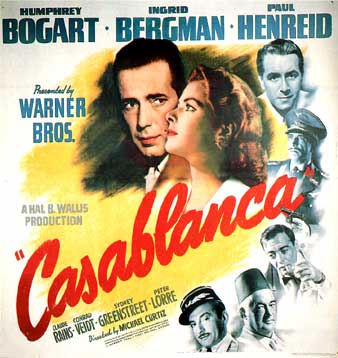 i haven't watched Casablanca (1942) for years, because of several misconceptions heard along the years according to which this movie is nothing more than a soft soap. however, after watching Michael Curtiz's "Angels with dirty faces", i decided it was high to give a chance to "Casablanca", because i couldn't imagine Curtiz directing something pathetic.
i haven't watched Casablanca (1942) for years, because of several misconceptions heard along the years according to which this movie is nothing more than a soft soap. however, after watching Michael Curtiz's "Angels with dirty faces", i decided it was high to give a chance to "Casablanca", because i couldn't imagine Curtiz directing something pathetic.